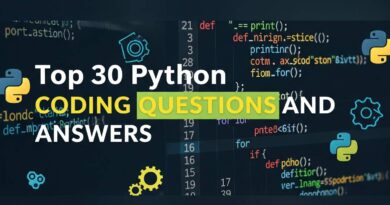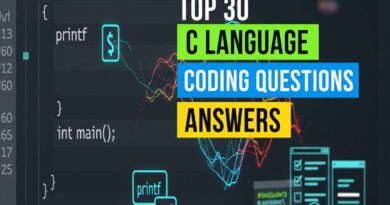STAR Method Explained-Answering Behavioral Interview Questions
STAR Method Explained – Answering Behavioural Interview Questions Like a Pro 🌟
⭐ What is the STAR Method?
The STAR Method is a structured way to respond to behavioural interview questions — those that typically start with, “Tell me about a time when…” or “Give an example of…”.
STAR stands for:
-
S – Situation
-
T – Task
-
A – Action
-
R – Result
This method helps candidates deliver concise, focused, and meaningful responses based on real experiences, rather than vague or theoretical answers.
📚 Why Interviewers Use Behavioural Questions
Hiring managers use behavioural questions to assess how a candidate has handled past situations to predict future behaviour in the workplace. For instance:
“Tell me about a time when you had to deal with a difficult teammate.”
Such questions test your problem-solving, communication, and adaptability skills—qualities vital for real-world success.
Also Read,
| How to Crack Campus Placements – A Smart Student’s Guide |
🧠 How to Use the STAR Method Step-by-Step
📍 Step 1: Situation – Set the Scene
Start by briefly describing the context.
Example:
“During my final year of college, I was part of a team working on a capstone project involving machine learning for predictive analytics.”
🎯 Step 2: Task – What Was the Objective?
What challenge or responsibility did you face?
Example:
“My responsibility was to collect data and build a clean dataset, which was crucial for model training.”
🛠️ Step 3: Action – What Did You Do?
Describe the specific actions you took. Focus on your contribution.
Example:
“I used Python and Pandas to clean the data, remove outliers, and deal with missing values. I also wrote a script to automate data fetching from an open-source API.”
🏆 Step 4: Result – What Was the Outcome?
Share the positive results and what you learned. Quantify if possible.
Example:
“The final model achieved 92% accuracy. Our project was selected as the best in our department, and I gained a deeper understanding of preprocessing and teamwork.”
🤖 Sample STAR Interview Answers for Common Questions
Q: Tell me about a time you solved a problem creatively.
Answer (STAR Format):
-
Situation: During a virtual hackathon, our team’s backend developer lost internet access mid-project.
-
Task: We needed a way to continue work without delaying deployment.
-
Action: I quickly suggested we use Replit to collaborate in-browser and migrated code from local Git to GitHub for real-time access.
-
Result: We submitted on time, and our team won 2nd prize for innovation.
Q: Describe a time you failed and what you learned.
Answer:
-
Situation: I missed a project deadline during my internship.
-
Task: I was responsible for preparing a weekly market trends report.
-
Action: I underestimated the time needed for data collection and didn’t ask for help.
-
Result: I learned to communicate early and set more realistic timelines. Since then, I started using Trello and Google Calendar for task planning.
Q: Tell me about a time you had a conflict with a teammate.
Answer:
-
Situation: During a group presentation, one member disagreed with the slide content.
-
Task: We needed a unified presentation to deliver as a team.
-
Action: I suggested we conduct a quick team poll and agreed to test both versions.
-
Result: We chose the stronger version after feedback and received appreciation for teamwork and coherence.
🧰 Real-Life Applications of STAR in Different Careers
🎓 For Students & Freshers:
Even with limited experience, you can apply STAR to college projects, internships, or volunteer work.
Example:
“Organised a college fest with a team of 20, handled vendor logistics under a strict budget, and the event drew over 1000 attendees successfully.”
🧑💻 For Tech Roles:
Focus on technical challenges and project contributions.
Example:
“Faced a deployment bug before a product demo; identified the root issue with API timeout, and implemented retries using Axios, fixing it before the deadline.”
🧑🏫 For Teaching/Training Roles:
Showcase leadership and communication skills.
Example:
“Designed a custom math module for slow learners, used visual aids and games, and saw a 30% improvement in quiz scores.”
📞 For Customer Support Roles:
Emphasise conflict resolution and patience.
Example:
“Calmed a frustrated customer who received a wrong order, initiated replacement quickly, and got positive feedback for service.”
🔄 For Career Switchers:
Use transferable skills from your previous industry or education.
Example:
“As a nurse transitioning to project management, I used my multitasking skills and calm demeanour to coordinate a team during a crisis scenario at a vaccination drive.”
🧩 Common Mistakes to Avoid When Using STAR
❌ 1. Giving Too Much Background
Stick to the point. Keep the situation and task concise.
❌ 2. Focusing on Team Over Self
Use “I” instead of “we” to show your contribution clearly.
❌ 3. Forgetting the Result
Always include the outcome, even if it was a learning moment.
❌ 4. Not Practising Out Loud
Practice makes you confident and ensures you stay within 1–2 minutes per answer.
🧠 Pro Tips to Master STAR Answers
-
Keep a personal story bank in Notion or Google Docs
-
Use the CAR variant (Challenge–Action–Result) for ultra-brief responses
-
Record your responses to fine-tune tone and timing
-
Customise examples based on the job role you’re applying for
🗂️ Downloadable STAR Worksheet (Optional Offer)
Offer a free PDF template for STAR practice.
📝 Want to practice STAR like a pro? [Download our Free STAR Method Worksheet here] (insert your downloadable link).
🌟 Conclusion: Be the STAR in Your Next Interview
The STAR Method is your ticket to structured, confident, and impressive interview answers. Whether you’re a student or a working professional, using STAR effectively can help you tell stories that stick—and get the job done.
Start practising today. Prepare your examples, structure your answers, and go shine in your next interview! 🚀
📤 Stay Updated with NextGen Careers Hub
📱 Follow us on Instagram
📺 Subscribe to us on YouTube
Please share our website with others: NextGenCareersHub.in






Comments are closed.